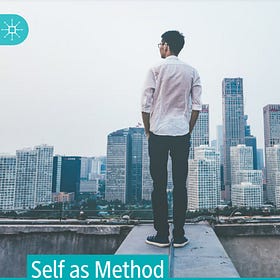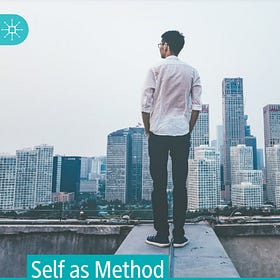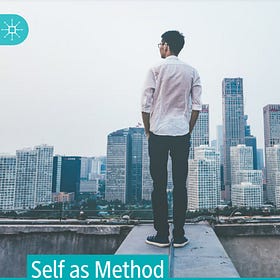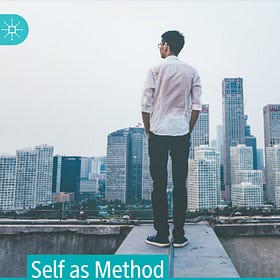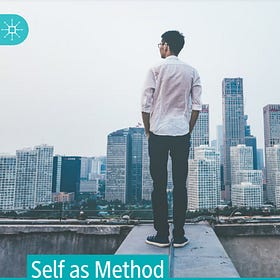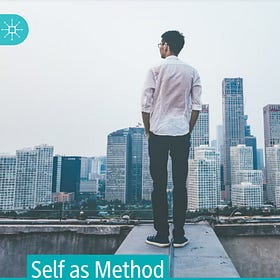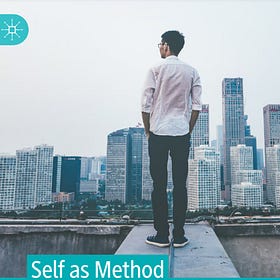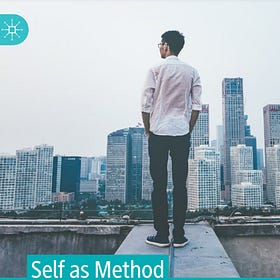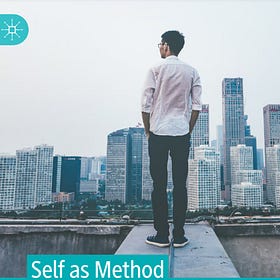Main Index; Self-As-Method – a book-long interview with Xiang Biao
I found the stunning intellect in the director of the Max Planck Institute for Social Anthropology Halle, Germany. Book in the format of 3 long interviews in Chinese, with Journalist Wu Qi. Pub 2020.
I apologize for the 10-day delay in posting. But preparing this book was so impactful that it inspired the launch of another project that some of us had been talking about last month, (and thinking about for years). We now have a model for that “Discussion Community”. I will introduce this new project first, and then below I will outline our December upload schedule for Self-As-Method – in 10 chapters.
(This is the Index Place Holder Index for the Xiang Biao book, and all the content chapters will be stored in here.)
___________
A Discussion Project:
What’s missing on the web, (and in life)? We can present our ideas, and accept or reject other people’s ideas, but where is it that we can talk about them? In the public discourse I think it doesn’t exist. You’re either “with us, or against us” type of arm-twisting, any suggestion to talk it over is treason. How about in the family – Ha. How about in business? On the main stream web you get censored for anything too far off of the standard narrative. Here, in our little niche, we are hopeful. But we also know we are being watched.
Everyone reading this, lives in some society. Therefore, we think, act, speak and listen from our cultural embeddedness. That allows us to relate to our fellow men and women, so it is a necessity. Another society, in either space, or in time, has, or had, their own code-speak. It is not so unified here either, and lots of people, maybe even our next-door neighbor, function through a different context. The mixing of world-wide stereo-types of thought and behavior is definitely today's trend.
WHAT IS DISCUSSION?
If you are the professor you are paid to get this interchange going; OR for us, we want to learn something for ourselves. Learn what? Learn not from a new authority, but learn maybe, that someone else's ideas, (even if they are not fully consolidated as of yet), can be a catalyst for my own thinking and my understanding process. You can call it synergy. There can be more discovery through dialog than merely through my own subjective musings. (And of course, I think about things by myself continually.)
Dialog is a kind of Scholarship.
Brain-Trusts are part of the academic world. We may think professors are political animals just spreading the university's narrative, and building university funding. But there are independent collaborations among academics, that express some "sovereignty of thought". Wow, these men and women are lucky. They have built an independent platform to "think" whatever, and wherever their process will lead them. I don't have any academic credentials, so I can't join.
But wait a minute; why can't you and I do it? Have our own brain trust right here?
We have started a project toward that end, and made tremendous progress in these days. I think the Substack platform is a good base. I learned that One Site can have a team of multiple hosts. That means discussions are not only confined to one person’s vision, nor to linear comment fields, (that go down and down and have no attachments, no graphics nor text enhancements). Team members are enabled to express their concerns with their own main-posts on the one-same-site. (They all retain their other separate sites and projects.) Then, other team members, subscribers, and visitors can discuss those concerns in each particular comment field.
So far, a few of us have posted a couple of things, mainly about how to form this group into an "International Community". International is not pretentious, it only means it is a writing exchange, and not confined to real-time nor real-local-space. It is not about a community of "like-minds". We are all different. But a collaboration based on homogeneity can’t take you very far. Our major similarity is our pledge to mutual respect.
I don’t see flooding the site with posts, although we all are full of ideas. So, there are only a few posts on there now, and it’s easy to survey them. It is just the beginning. Let’s just see what comes up through your, and other people’s reactions, and then take it from there.
Our model is on:
Please check it out. I think it holds great promise. And you can be on the team. That can make it a deeper participation than with other sites.
________________
Back to Self as Method, “Thinking through China and the World.”
Do you know David Ownby? He chairs a department in the Université de Montréal Montréal, QC, Canada, now retired I believe. They funded his huge site for years. https://www.readingthechinadream.com/people.html
He is a Chinese specialist at the university and has translated about one text per week on Chinese contemporary intellectual life on this, his own site . There are 100’s as you see on the above link. I don’t know what he will now after retirement, just since maybe this summer. I think he has travel plans, and maybe will write travel-logs.
He translated and edited this Xiang Biao book in its English version. He has licensed it under Creative Commons, anyone can upload it. (I will put the license below.)
___________
Here I am filling out the Index, and we will start with the content shortly. Frankly, I am stunned by this book. Everything about our project mentioned above, Xiang Biao has already manifested in his life. When I said above “Intellect”; Well, what is that? It is just that he is so grounded, so careful with semantics, blows no hot air of lofty concepts, and skirts around those people who do. He always attaches his cultural anthropology to what can make a difference in someone’s life. He is a committed mentor to his students and to the younger generation. Like many great masters, he practices that deep teaching usually must be one-on-one, like with thesis management. Otherwise, you are going to remain drowning in your own nations’ self-narrative. I can’t give this book enough votes or thumbs-up!
REALLY, I CAN’T STOP TALKING ABOUT THIS GUY. But let’s move on.
1. Self-as-Method, Introduction by David Ownby
SIDE NOTE: On the Book Index Page, yesterday, I pointed to an initiative that partially came from reading this book. Sometimes academics are able to create an independent cross-border platform for comparing and critiquing ideas. Lot’s of innovation can pour out of these collaborations.
2. Self-as-Method,
Wu Qi: I first wanted to ask why you are interested in the interview format. In China, it is not too common, and most scholars are not used to expressing themselves through interviews. In part, this is because interviews don’t count on their CVs, and with the decline in mass media in the past few years, there are even fewer quality interviews with schol…
3. Self-as-Method,
Note: May I remind you of our initiative to propose short topics that are more adapted to discussion. And like we will discover in this current book, those topics seek to be relevant to every-day life and not be too abstract. We’d love to see you there and have some feedback, comments and questions.
4. Self-as-Method,
Wu Qi: At present, the most common mood among Chinese youth on the Internet is “melancholy.” Material conditions are better and kids have more freedom and their own hobbies and are starting to have fun, but the result is that they all lapse into a universal funk as if nothing had any meaning, and they can’t see how life will change.
5. Self-as-Method,
Let me say “Merry Christmas” (today) to those of the Christian faith. Whether you are renewing your relationship to God and Jesus, enjoying family connections with dinner and a get-together, or just imbibing the holiday spirit around Christmas and New Year’s, I wish you all the best.
6. Self-as-Method,
Sometimes I like to hear and participate in a discussion. Here in the library, we don’t get many comments, and I am thinking book chapters are too long, and focus on multiple topics. For this I have joined with another “discussion-site”, WhyNotThink. The real name was Why Not Think Differently, but we all opted for the abbreviated name. That site is…
7. Self-as-Method,
I am uploading this segment on January 1st 2024, so happy New Year. There are three more segments to finish this book. I hope that I will find additional relevant material from the Chinese perspective. But I still have the two major works of Lev Nikolayevich Gumilev, that I feel must be in our Library.
8. Self-as-Method,
Wu Qi: To continue our discussion of community, perhaps we can be a bit more concrete. What sort of expectations should we have of universities today? What should universities be doing? Xiang Biao: Universities function differently in different eras. In China, we have entered a period where material conditions are pretty good and the education level is q…
9. Self-as-Method,
Xiang Biao: Coming back to Wenzhou this time inspired me with a lot of thoughts and feelings. On this trip, I went from Oxford to Beijing and then from Beijing to Wenzhou, and the three worlds are very different. Oxford is quiet and the rhythm is slow. Beijing is fast and busy, with a sort of forthrightness about the business at hand, like you have to m…
10. Self-as-Method,
This is the last section of Self-as-Method. I hope you have enjoyed it as much as I have. If you haven't been following, may I suggest going back to the beginning to give it a read. Xiang Biao is a refreshing practical individual that doesn't talk airy abstractions or political correctness. He doesn't base any of his discussion on the "axioms" of th…
I reformatted from book size to 8 ½ x 11 with size 11 font, so I have less pages, about 130. The original book has about 263 pages, but nothing has been modified. I am going to upload shorter segments than I usually do, because maybe, each are worth some comment or discussion. About 13 to 15 pages each, with 10 uploads. Here is the upload plan:
Contents (and my page numbers)
1st upload from p 4
Introduction, by David Ownby
2nd upload from p 16
Beijing Interview, March 2018
Setting the Stage
A Childhood Picture
The 1980s Culture Craze
3rd upload from p 30
Beida After 1989
Researching Zhejiang Village
4th upload from p 43
Youth Melancholy
The Center and the Margins
Personal Crisis
5th upload from p 54
Globalization and Anti-Globalization
Using the 1980s to Critique the 1980s
What is Criticism?
Empathetic Scholarship
6th upload from p 71
Oxford Interview, August 2018
Setting the Stage
Impressions of Oxford
A Sense of Distance and Directness
Anthropologists and Their World
Non-Fiction Writing
7th upload from p 86
Academics Is Not a Vocation
Nationalism and Populism
Singapore Enlightenment
The Importance of Community
Building Your Own Cross-Border Worlds
8th upload from p 99
Universities Should Look for the Exceptional
Problematizing Individual Experience
New Research
Common Ideals
Local Gentry as Method
9th upload from p 113
Wenzhou Interview, December 2018
Setting the Stage
Social Reproduction
The Paradox of Class Mobility
10th upload from p 127
Looking for a New Discourse
Anthropology as Intermediary
The Local Gentry: Once More with Feeling
The Index
Chinese-language Glossary, - special terms are written in the original Chinese characters, so you can better search them on the Chinese web. Then translate your Chinese results. I’ll put them below the license, in this file.
Xiang Biao’s Selected Publications, this I’ll put this somewhere.
Index I can’t use it, because I didn’t use the original page numbers. (in fact, I don’t use any page numbers on Substack.)
Open Access License
This chapter (and all others) are licensed under the terms of the Creative Commons Attribution-NonCommercial-NoDerivatives 4.0 International License (http:// creativecommons.org/licenses/by-nc-nd/4.0/), which permits any noncommercial use, sharing, distribution and reproduction in any medium or format, as long as you give appropriate credit to the original author(s) and the source, provide a link to the Creative Commons license and indicate if you modified the licensed material. You do not have permission under this license to share adapted material derived from this chapter or parts of it.
The images or other third-party material in this chapter are included in the chapter’s Creative Commons license, unless indicated otherwise in a credit line to the material. If material is not included in the chapter’s Creative Commons license and your intended use is not permitted by statutory regulation or exceeds the permitted use, you will need to obtain permission directly from the copyright holder.
Glossary
Accepting fate without giving up 认命不认输
Appreciation of Masterpieces《佳作欣赏》
Banyuetan《半月谈》
Beida 北大
Beiyang militarist 北洋军阀
Center for Research on the Chinese Economy 中国经济研究中心
chaxugeju (differential mode of association) 差序格局
Chen Yueguang 陈越光
Chen Kuan-Hsing 陈光兴
Chen Yun 陈云
China on the Edge《山坳上的中国》
Chinese Peasants《中国农民》
crisis consciousness 危机意识
Cultural Revolution 文化大革命
Dai Jinhua 戴锦华
danwei 单位
Deng Xiaoping 邓小平
diaosi 屌丝
Didi 滴滴
Dong Furen 董辅礽
Drifting with the Beggars’ Gang《丐帮漂流记》
Du Ying 杜鹰
Fan Gang 樊纲
Fei Xiaotong 费孝通
Fan Yusu 范雨素
gaitu guiliu 改土归流
Gan Yang 甘阳
Gao Jianguo 高建国
Gao Pingzi 高平子
Gazetteer 地方志
Guo Yujie 郭玉洁
Great Leap Forward 大跃进
great unity 大一统
He Bochuan 何博传
Hu Feng 胡风
Hu Shi 胡适
Huang Jisu 黄纪苏
hukou (household registration system) 户口
Indentured Workers《包身工》
jia (false) 假
Jia Lusheng 贾鲁生
Jin Guantao 金观涛
Li Kang 李康
Li Meng 李猛
Li Siguang 李四光
Liang Shuming 梁漱溟
Lin, Justin Yifu 林毅夫
Liu Qingfeng 刘青峰
Liu Shiding 刘世定
Liu Zaifu 刘再复
Lü Xinyu 吕新雨
Lu Xun 鲁迅
Luo Danni 罗丹妮
Mao Zedong 毛泽东
mass line 群众路线
Minzu University of China 中央民族大学
national studies 国学
Northern Expedition 北伐
Peking University 北京大学
Peng Pai 彭湃
private plot 自留地
Qian Gang 钱钢
Qian Liqun 钱理群
Qin Hui 秦晖
qiuji (right to exist on the planet) 球籍
River Elegy《河殇》
root culture 乡土文化
shangfang 上访
Shen Honglie 沈鸿烈
shengnü 剩女
Shenzhen Special Zone News《深圳特区报》
Shi (Propensity) 势
shi (real) 实
Sun Liping 孙立平
Sun Yat-sen 孙中山
Sun Yirang 孙诒让
suspension 悬浮
suzhi 素质
Szeto Wah 司徒华
Taijiquan 太极拳
Takeuchi Yoshimi 竹内好
The Dream of the Red Chamber《红楼梦》
tianxia 天下
Tong Dalin 童大林
Toward the Future (book series) 走向未来 (丛书)
Tsinghua University 清华
tuantigeju (organizational mode of association) 团体格局
Uniting the Three Traditions《通三统》
Wang Hansheng 王汉生
Wang Hui 汪晖
Wang Shaoguang 王绍光
Wang Sibin 王思斌
Wang Xiaoqiang 王小强
Wang Yuanhua 王元化
Weiming lake 未名湖
Wenhui Monthly《文汇月刊》
work hole 工作洞
World Economic Herald《世界经济导报》
Wu Qi 吴琦
Xia Yan 夏衍
Xiang Biao 项飙
xiangshen (gentry) 乡绅
xin qimeng (new Enlightenment) 新启蒙
xu (fake) 虚
Xu Bing 徐冰
Yu Changjiang 于长江
Yu Luojin 遇罗锦
Yuan Shikai 袁世凯
Zhang Jiasheng 张家声
Zhang Taiyan 章太炎
Zhang Zai 张载
zhanyou 占有
zhen (true) 真
Zheng He 郑和
Zheng Yefu 郑也夫
Zheng Zhenduo 郑振铎
Zhongshan University 中山大学
Zhou Enlai 周恩来
Zhou Feizhou 周飞舟
Zhou Qiren 周其仁
zhua 抓
Zhu Ziqing 朱自清
.



